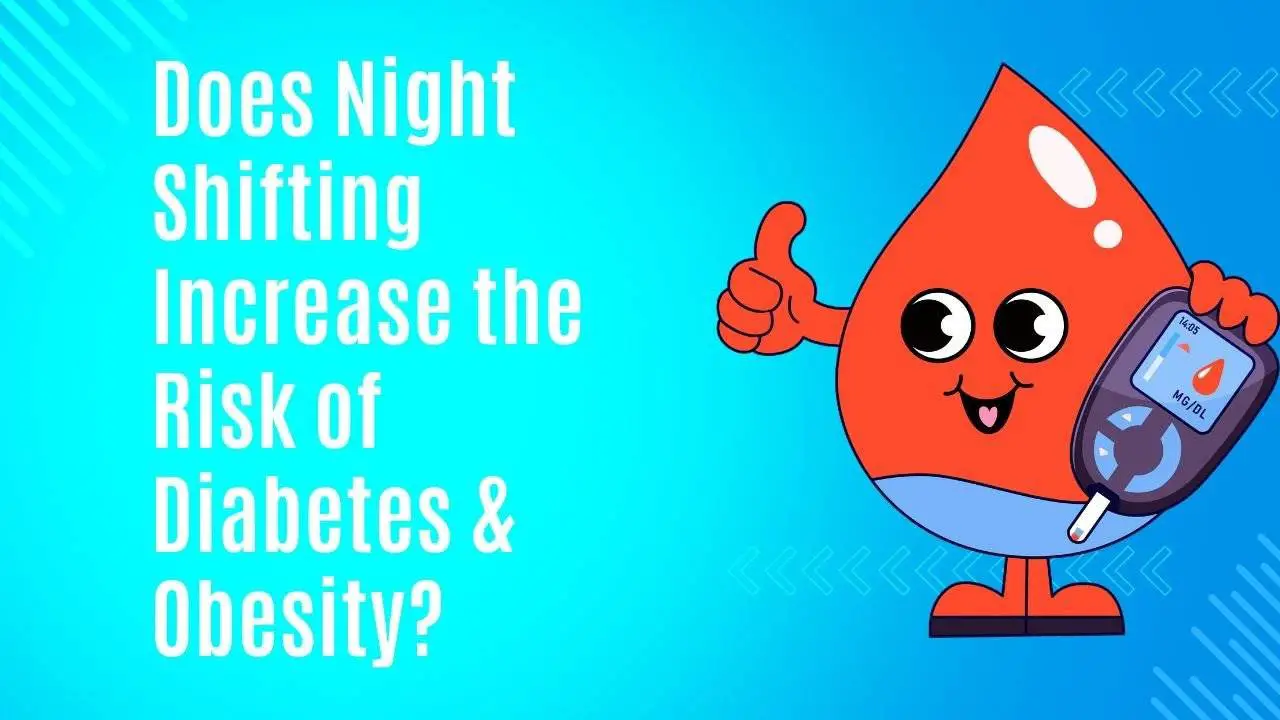Night shift work is linked to higher diabetes and obesity risks. Circadian misalignment from night shifts disrupts hormone regulation.

Working the night shift poses a significant challenge to the body’s natural rhythms. It disrupts the circadian clock, which can lead to hormonal imbalances and a host of metabolic issues. The irregular hours of night shift workers often clash with the body’s typical cycle of sleeping at night and being active during the day.
This disruption can cause changes in appetite and metabolism, increasing the likelihood of weight gain and the development of conditions like diabetes. Recent studies suggest that even a few days of night shift work can throw off the body’s protein rhythms related to glucose regulation and energy metabolism. This not only impacts an individual’s immediate well-being but also raises long-term health concerns. Understanding the relationship between night shift duties and metabolic health is crucial for the millions who work these hours and for the employers who manage shift work schedules.
Credit: www.nih.gov
The Biological Clock And Metabolism
The Biological Clock and Metabolism play crucial roles in how our bodies function. Understanding these systems helps explain why night shift work may lead to health issues like diabetes and obesity.
Circadian Rhythms And Health
The circadian rhythms, or our internal biological clock, sync our sleep and wake cycles with the day and night. Disrupting these rhythms, as seen in night shift workers, can lead to serious health problems.
- Increased appetite due to hormonal imbalances
- Poor insulin regulation which can lead to diabetes
- Higher risk of obesity from erratic eating times
Metabolic Processes During Sleep
At night, our body’s metabolism slows down to conserve energy. Key processes include:
| Process | Function |
|---|---|
| Hormone production | Regulates hunger and digestion |
| Cell repair | Heals and restores body tissues |
| Energy conservation | Reduces calorie burn |
Working nights interrupt these essential functions, increasing health risks.
Night Shift Work And Circadian Disruption
Working night shifts can turn your body’s clock upside down. Your natural sleep-wake cycle, known as your circadian rhythm, gets disrupted. This can lead to serious health issues, including diabetes and obesity. Let’s explore how night shift work affects your body and what changes happen.
Effects On Hormones
Night shift work can mess with your hormones. These chemicals in your body help control when you feel hungry or full. They also manage how your body uses sugar and fat. When you work at night, these hormones may not work right. This can make you eat more or store more fat.
- Insulin – controls your blood sugar levels.
- Leptin and Ghrelin – control your appetite.
- Cortisol – known as the stress hormone.
Normally, these hormones rise and fall during the day. But night workers have different patterns. This can increase the risk of weight gain and high blood sugar.
Sleep Pattern Changes
When you work at night, you often sleep during the day. This is not what your body is used to. Daytime sleep is often shorter and not as deep as nighttime sleep. This can make you feel tired. It can also make you more likely to reach for unhealthy snacks for a quick energy boost.
| Normal Sleep Pattern | Night Shift Sleep Pattern |
|---|---|
| 7-9 hours at night | Often less than 6 hours during the day |
| Deep, restorative sleep | Lighter, more interrupted sleep |
This change in sleep quality can upset your body’s balance. It might make you gain weight and have trouble controlling your blood sugar. This puts you at a higher risk for diabetes and obesity.
Impact On Eating Habits And Weight Gain
Working night shifts can turn your world upside down, especially when it comes to eating habits and weight gain. The body’s internal clock gets confused, leading to changes in when and what you eat. This can make staying healthy much harder. Let’s dive into how altered meal times and snacking affect diet quality for night shift workers.
Altered Meal Times
Regular meal times fly out the window for night shift workers. Eating at odd hours can disrupt the body’s natural rhythm. This can lead to weight gain and higher blood sugar levels.
- Lunch at midnight can confuse your body.
- Breakfast in the evening isn’t typical.
- Dinner in the early morning? That’s night shift reality.
Eating against the body’s clock can make it hard to control weight and can increase diabetes risk.
Snacking And Diet Quality
Night workers often grab snacks instead of meals. These aren’t always healthy choices. High-calorie snacks can lead to unwanted weight.
| Snack Type | Calories | Impact |
|---|---|---|
| Chips | High | Weight Gain |
| Fruits | Low | Better Health |
| Nuts | Moderate | Good Fats |
Choosing healthy snacks can make a big difference in diet quality for night shift workers.
Physical Activity And Night Workers
Night shift workers often face unique challenges that can affect their health. One of the key areas impacted is physical activity. Regular exercise is crucial for maintaining health, but night workers may find it harder to fit this into their busy schedules. Let’s delve into the factors that create barriers to exercise for those who work when most of the world sleeps.
Barriers To Exercise
Night workers struggle with finding time to exercise. After a long night’s work, the desire to sleep can outweigh the motivation to be active. Access to facilities is another issue, as many gyms are not open during the hours night shift workers are free. Furthermore, social support can be limited, as friends and family are likely on different schedules.
Sedentary Behavior
During night shifts, many workers experience long periods of inactivity. Jobs that require sitting at a desk or standing in one spot can lead to a sedentary lifestyle. This lack of movement is linked to increased risks of diabetes and obesity. Encouraging regular breaks and incorporating simple exercises into the night routine can help combat this issue.
| Challenges | Solutions |
|---|---|
| Time Constraints | Short, High-Intensity Workouts |
| Limited Gym Access | Home or Outdoor Exercises |
| Social Support | Online Fitness Communities |
By understanding these barriers and promoting ways to integrate activity into the night shift routine, workers can help protect their health against diabetes and obesity.
Diabetes Risk Among Night Shift Workers

Working night shifts can change how your body handles sugar. This can lead to diabetes to people who work at night face a higher risk of this disease.
Blood Glucose Regulation
Our bodies turn food into glucose. Glucose gives us energy. A hormone called insulin helps our cells use glucose. At night, our body’s way of handling glucose can change. This can be a problem for night shift workers.
Insulin Resistance
Insulin resistance happens when cells don’t respond well to insulin. This means glucose stays in the blood. It can’t get into cells to be used for energy. Working at night can make this problem worse. This can lead to higher blood sugar and diabetes.
Regular night shift work can disrupt sleep and eating patterns. Disrupted patterns can lead to insulin resistance. Insulin resistance can increase diabetes risk.
- Body clocks are set to sleep at night and be active during the day.
- Night shifts can upset this natural rhythm.
- Upset rhythms can make it hard to control blood sugar.
Healthy tips for night shift workers include:
- Eat balanced meals and snacks.
- Try to keep a regular sleep schedule.
- Exercise regularly.
By taking these steps, night shift workers can help manage their risk of developing diabetes.
Credit: newsinhealth.nih.gov
Obesity Trends In Shift Workers
Shift workers face unique challenges that can affect their health. One alarming trend is the rise in obesity within this group. The irregular hours of night shifts disrupt the body’s natural rhythm. This can lead to weight gain and serious health issues. Let’s explore the connection between night shift duties and obesity.
Body Mass Index Studies
Research shows that shift workers have higher Body Mass Index (BMI) numbers. BMI is a measure used to determine if a person has a healthy weight. Studies have found that those working at night tend to have higher BMIs than day workers.
Scientists believe this is due to changes in diet and sleep patterns. Night shift workers often eat at irregular times. They also have fewer options for healthy food. This can lead to poor dietary choices. Furthermore, lack of sleep can cause hormonal imbalances. These imbalances can increase hunger and lead to overeating.
Obesity-related Health Conditions
Higher BMI is not just about weight. It can signal serious health risks. Obesity can lead to diabetes, heart disease, and more. Night shift work is linked to these conditions. The disruption of the circadian rhythm affects the metabolism. This makes it harder for the body to process sugar.
The table below highlights the key health concerns for obese shift workers:
| Condition | Risk Factors |
|---|---|
| Diabetes | High BMI, irregular eating, circadian disruption |
| Heart Disease | Increased blood pressure, poor diet, stress |
| Sleep Disorders | Altered sleep patterns, insomnia |
Understanding these risks is the first step in managing them. Shift workers should be aware of their unique health needs. Employers can also play a role. They can provide resources to help manage these risks. Healthy food options and flexible scheduling can make a big difference. Together, we can work towards better health for shift workers.
Mitigating Health Risks
Working night shifts can disrupt the body’s natural rhythms. This disruption may lead to diabetes and obesity. But fear not! With the right steps, these risks can be managed. Let’s explore how sleep hygiene and nutrition can help protect your health.
Sleep Hygiene Strategies
Quality sleep is vital for health. Here are tips for better sleep after night shifts:
- Darken your room: Use blackout curtains to mimic nighttime.
- Keep a schedule: Try to sleep at the same time daily.
- Avoid screens before bed: Blue light from screens can disturb sleep.
- Reduce noise: Earplugs or white noise machines can help.
Nutritional Interventions
Eating right is key to managing health risks:
| Time of Eating | Type of Food | Benefits |
|---|---|---|
| Before the shift | Light meal with protein | Energy without drowsiness |
| During the shift | Small, healthy snacks | Steady energy, maintain metabolism |
| After the shift | Whole foods, low in sugar | Better rest, avoid weight gain |
Remember to stay hydrated and limit caffeine close to bedtime.

Credit: www.news-medical.net
Future Research And Policy Changes
Understanding the link between night shift duties and the increased risk of diabetes and obesity is critical. The research community is now pivoting towards more robust investigations. These efforts may inspire policy changes to protect the health of night shift workers. Let’s explore the avenues for future research and necessary policy shifts.
Longitudinal Studies
Long-term research can shed light on the true impact of night shift work. Scientists propose longitudinal studies to track changes in workers’ health over time. This data is vital for creating guidelines to minimize health risks.
- Assess long-term health outcomes
- Identify key factors that influence risk
- Develop targeted interventions
Workplace Health Programs
Employers can play a huge role in reducing health risks. Workplace health programs tailored for night shift employees could be revolutionary. These programs could offer:
| Nutrition Support | Exercise Facilities | Sleep Education |
|---|---|---|
| Healthy meal options | On-site gyms or fitness classes | Tips for better sleep |
Such initiatives can create healthier work environments. They promote well-being and potentially reduce the risk of chronic conditions.
Frequently Asked Questions
How Does Night Shift Cause Obesity?
Night shift work disrupts the body’s natural circadian rhythms, leading to poor sleep and hormonal imbalances. These changes can increase appetite and decrease metabolism, often resulting in weight gain and obesity.
Why Do Night Shift Workers Often Experience Obesity Diabetes And Increased Risk Of Accidents?
Night shift work disrupts natural sleep cycles, leading to poor sleep and hormonal imbalances. This can increase appetite and reduce metabolism, raising the risk of obesity and diabetes. Additionally, fatigue from irregular sleep increases the likelihood of accidents.
What Is The Health Issue Due To Night Shift?
Night shift work can lead to health issues such as disrupted sleep patterns, increased risk of metabolic disorders like diabetes and obesity, and cardiovascular problems.
Are Night Shift Workers At Greater Risk Of Developing Metabolic Syndrome?
Yes, night shift workers are at increased risk for metabolic syndrome due to disrupted sleep and eating patterns.
Conclusion
Navigating night shift work requires awareness of its health implications. Research consistently links irregular hours to increased diabetes and obesity risks. Prioritizing sleep and balanced diets can mitigate these effects. Embrace lifestyle adjustments to safeguard well-being while working against the clock.
Stay informed, stay healthy.

I am a blogger for holistic wellness & longevity. With a passion for nutrition, fitness, & mindfulness, I’m dedicated to sharing insights on healthy living. Join my journey towards a vibrant life with practical tips & evidence-based advice. Embrace vitality and thrive with me!

